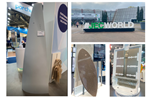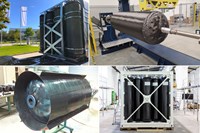Toray subsidiary establishes glass fiber recycling process in Europe
Calculations from SKZ confirm that polyphenylene sulfide (PPS) made with this proprietary recycling process reduces the carbon footprint by 45%.
Share

Photo Credit: Getty Images
On June 1, Toray Industries Inc. (Tokyo, Japan), announced that its marketing
and sales subsidiary, Toray Resins Europe GmbH (TREU, Neu-Isenburg, Germany) has established a recycling process for glass fiber-reinforced polyphenylene sulfide (PPS) resin waste from injection molding processes. TREU created its process by leveraging proprietary compounding technology in collaboration with tolling partner MKV GmbH Kunststoffgranuate (Beselich, Germany), a compounding company that specializes in recycling engineering and high-performance plastics. Such resin is said to have 50% recycled content and retains at least 90% of the mechanical strength that injection grades from original materials deliver.
Plastics testing and research center SKZ – Das Kunststoff-Zentrum (Würzburg, Germany), also known as the German Plastics Center, has calculated and verified that PPS made with this recycling process can deliver a carbon footprint that is around 45% lower than that of original PPS. The calculation was conducted based on the international lifecycle assessment (LCA) standards ISO 14040, ISO 14044 and the standard ISO 14067 “Carbon footprint of products.”
TREU, which supplies PPS resins to customers throughout Europe, is beginning to promote this recycled PPS solution as Ecouse Torelina. Ecouse is Toray’s integrated, worldwide brand for recycled materials and products.
Glass fiber-reinforced PPS offers high flame resistance, long-term durability and chemical resistance. As a result, it enables diverse applications, including electric vehicles and other automobiles, electrical and electronic equipment and water-related parts. According to Toray, conventional glass fiber-reinforced PPS recycling has had repeated molding shortens and breaks the glass fibers, greatly degrading mechanical strength and this issue has constrained recycling rates.
To learn more about Toray’s other sustainability initiatives, read “Toray to develop sugar from biomass waste for production of resins, fibers.”
Related Content
-
Materials & Processes: Composites fibers and resins
Compared to legacy materials like steel, aluminum, iron and titanium, composites are still coming of age, and only just now are being better understood by design and manufacturing engineers. However, composites’ physical properties — combined with unbeatable light weight — make them undeniably attractive.
-
The making of carbon fiber
A look at the process by which precursor becomes carbon fiber through a careful (and mostly proprietary) manipulation of temperature and tension.
-
PEEK vs. PEKK vs. PAEK and continuous compression molding
Suppliers of thermoplastics and carbon fiber chime in regarding PEEK vs. PEKK, and now PAEK, as well as in-situ consolidation — the supply chain for thermoplastic tape composites continues to evolve.











.jpg;maxWidth=300;quality=90)




